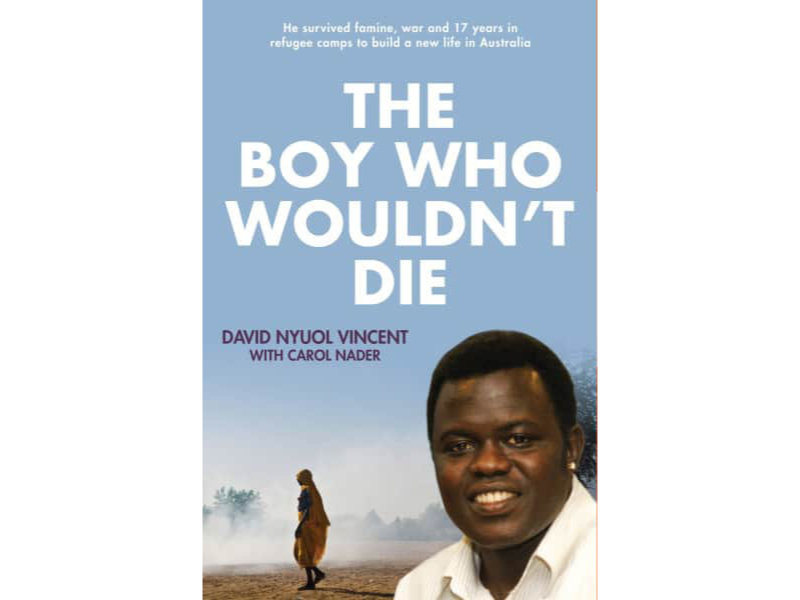David Nyuol Vincent was the boy who wouldn’t die. His story of fleeing war-torn Southern Sudan with his father is captivating. It is written in a matter-of-fact way, void of any bitterness or hostility, nor seeking to emotionally manipulate. It appears to reflect the manner in which he was trained to survive as a child soldier – by not showing emotion. Yet the book is candid and respectful.
David’s impoverished life living with his mother and sister in a tiny hut was hard. They barely had enough food for one meal a day, but there was comfort in the family unity. His father would often come and go mysteriously due to the war raging against the north and south which continued to increase in intensity. On one of his returns, when David was eight years old, his father announced that David and his sister, Abuk were moving to another village. His distraught mother who was pregnant at the time was left behind as there was no way she would have survived the dangerous journey.
David’s hellish journey began as he left the village in the middle of the day, when the sun was at its most brutal, so as not to arouse suspicion. Barefoot, they walked for hours, drinking from streams and diving into bushes at the first sign of danger. When they reached their father’s village, they stayed for a short time before making the even more hazardous journey to Ethiopia. They would have to cross the Sahara desert where temperatures reached 45 degrees Celsius. David’s father had a strategy for their survival. Abuk was left behind with relatives. The odds were against her surviving what lay ahead for both David and his father. It’s hard to imagine an eight year old boy being made to walk for months, barefoot and in brutal heat, but that was only the beginning of David’s nightmare. After surviving the excruciating walk to Ethiopia, he was separated from his father and left to survive on his own.
Over the next seventeen years, he had to endure a merciless initiation into military training in preparation to be sent to the frontline as a child soldier; everyday he had to fight to survive starvation; disease; being killed by wild animals; stepping on mines, or being hunted down by the enemy. He watched thousands of people die; many were his friends who he had to bury. He witnessed unspeakable horrors that a child should never have to see. All the while he wondered if his family were still alive.
Finally, at the age of twenty-six, David was granted a humanitarian visa as one of the Lost Boys of Sudan. He began a new life in Australia. He may have been safe from the devastation of war and famine but his demons followed him to Australia, and unleashed their full force in a new battle that raged in his mind. The flashbacks and horror of what he had witnessed tormented him and the process of healing was mentally arduous. Yet, he committed himself to breaking free of his demons by helping others, and getting a university education. There were questions left unanswered. Although there was mention of his mother and sisters at the beginning of the book, and that his mother was pregnant when David was forced to flee and leave her behind, no detail was given of the other siblings. The only sibling he speaks of is his sister Abuk. What happened to the rest of his family?
The Boy Who Wouldn’t Die is an excellent book that will keep you turning the pages as you make the journey with David and wonder what will happen next. It does not go into extreme graphic detail about everything David witnessed but it gives you a fascinating insight into the mind of a person who managed to survive an unspeakable injustice and still retain his dignity. It was also interesting to read of David’s reaction to the murder of a teenage Sudanese boy who was bashed to death by white Australians. Having come from a country where danger and violence is visual on a daily basis, he was not warned that the dangers in Australia are hidden and can strike without warning. In Africa he was trained to be alert to danger and expected it so it came as a big shock to him when he had let his guard down only to find that danger lurks in every country.
What good can come from a refugee? More good than comes from the average person who takes life for granted and lives only to please themselves. This book proves that everyone deserves an opportunity to live a better life because those who have truly suffered as David and his friends did, are the ones who are the most compassionate and willing to help others in need to play the opportunities forward. One of David’s friends, who was also a Lost Boy, is Emmanuel Jal, now a famous hip-hop artist who collaborates with David as a humanitarian advocate for social justice and human rights. Will you read this book and put it away? I doubt it. Knowledge is power. It’s up to you what you do with it.
Book Information
| Book Title | The Boy Who Wouldn’t Die |
| Author | David Nyuol Vincent |
| Description | The inspiring true story of David Nyuol Vincent, a Sudanese child soldier refugee who survived famine, wars and 17 years in refugee camps to build a new life in Australia. David Nyuol Vincent was a little boy when he fled southern Sudan with his father, as war raged in their country. He left behind his distraught mother and sisters, his village and his childhood. |

